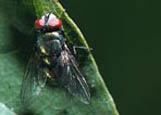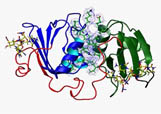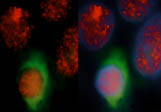About the Majors
To Learn More about the Life Sciences Departments, please see:
https://lifesciences.ucla.edu/departments/
Biology; Ecology, Behavior, and Evolution; Marine Biology (Dept.of Ecology and Evolutionary Biology)
About the Field
 A major challenge of modern biology is to seek answers to the many secrets of living organisms. Today, more than ever, studies in organismic biology touch every aspect of our lives in such areas as medical innovations, agricultural improvements, biotechnology, genetic engineering,environmental degradation, and threats to biodiversity. To meet this challenge, the Department of Ecology and Evolutionary Biology (EEB) offers a wide spectrum of undergraduate instruction in the biology of whole organisms, the environment, population, evolution, and behavior. The Biology major allows students to design their major to include courses from several large categories covering all of the life sciences departments. The Ecology, Behavior, and Evolution major includes environmental and conservation biology as well as in the three main fields of the major. In the Marine Biology major, students can specialize in marine sciences at any level from molecular biology to community ecology. Internships are available for credit in which students participate in hands-on learning about animal behavior, the local land and ocean environment, and science education. In addition Stunt Ranch (part of the UC Natural Reserve System), and the Mildred E. Mathias Botanical Garden offer opportunities for internships and for service to the community. Involvement in undergraduate research is a top priority for students in the EEB undergraduate program.
A major challenge of modern biology is to seek answers to the many secrets of living organisms. Today, more than ever, studies in organismic biology touch every aspect of our lives in such areas as medical innovations, agricultural improvements, biotechnology, genetic engineering,environmental degradation, and threats to biodiversity. To meet this challenge, the Department of Ecology and Evolutionary Biology (EEB) offers a wide spectrum of undergraduate instruction in the biology of whole organisms, the environment, population, evolution, and behavior. The Biology major allows students to design their major to include courses from several large categories covering all of the life sciences departments. The Ecology, Behavior, and Evolution major includes environmental and conservation biology as well as in the three main fields of the major. In the Marine Biology major, students can specialize in marine sciences at any level from molecular biology to community ecology. Internships are available for credit in which students participate in hands-on learning about animal behavior, the local land and ocean environment, and science education. In addition Stunt Ranch (part of the UC Natural Reserve System), and the Mildred E. Mathias Botanical Garden offer opportunities for internships and for service to the community. Involvement in undergraduate research is a top priority for students in the EEB undergraduate program.
Opportunities
The three majors in the Department of Ecology and Evolutionary Biology provide specialized instruction and strong preparation for employment or graduate study in many fields, including medicine, dentistry,pharmacy, and other health-related professions, biotechnology, scientific research, teaching, and public health. A Specialization in Computing is available to help prepare students for work in the fields of biotechnology, computational biology, and bioinformatics.
Physiological Science (Dept. of Integrative Biology andPhysiology)
About the Field
 The cornerstone of the Integrative Biology and Physiology curriculum is vertebrate physiology, with an emphasis on integrative functions. The research and educational programs focus on integrative physiology at several levels of organization from molecules to living organisms,microscopic structures to macroscopic organization, and cellular properties to organ functions. Students receive comprehensive instruction in all areas of physiological science while elective courses reflect faculty research expertise in molecular neurobiology, neuromuscular physiology, neuroendocrine physiology, cardiac physiology, diet and degenerative disease, auditory and visual behavior, biomechanics of rehabilitative medicine, biomechanics of exercise, histochemistry, developmental auditory neurobiology, muscle cell biology, and neuromotor control.
The cornerstone of the Integrative Biology and Physiology curriculum is vertebrate physiology, with an emphasis on integrative functions. The research and educational programs focus on integrative physiology at several levels of organization from molecules to living organisms,microscopic structures to macroscopic organization, and cellular properties to organ functions. Students receive comprehensive instruction in all areas of physiological science while elective courses reflect faculty research expertise in molecular neurobiology, neuromuscular physiology, neuroendocrine physiology, cardiac physiology, diet and degenerative disease, auditory and visual behavior, biomechanics of rehabilitative medicine, biomechanics of exercise, histochemistry, developmental auditory neurobiology, muscle cell biology, and neuromotor control.
Opportunities
Interactions, by means of coursework and undergraduate research, within the Division of Life Sciences and with the Center for Health Sciences departments, provide unique opportunities for intellectual development. Members of our faculty are active in organized research units at UCLA such as the Brain Research Institute, the Jules Stein Eye Institute, and the Jerry Lewis Neuromuscular Research Center. We invite you to apply to the Department of Integrative Biology and Physiology and to join us in the exciting and challenging quest to understand the functions of the human body.
Microbiology and Molecular Genetics
About the field
 The Microbiology and Molecular Genetics major has as its goals not only the introduction of the student to general and medical microbiology, but also to the associated disciplines of molecular genetics, molecular biology, biochemistry, virology, and immunology. Study in the major includes broad survey of general microbiology, immunology, advanced molecular genetics, and biochemistry.In addition to the core, the student may choose elective courses from diverse microbiology-related topics to complete the program. Because the major allows some flexibility in choosing electives, programs tailored to the student’s educational objectives are easily obtained. To make best use of the opportunity, the department suggests each microbiology major meet with the undergraduate staff or faculty advisor for individualized program counseling. Amongst the various research interests of our faculty are gene transcription and regulation; the study of pathogenic bacteria; immunology; biochemical and molecular basis of microbial interactions. A complete description of the major and faculty research interests is available on the departmental website at: http://www.mimg.ucla.edu.
The Microbiology and Molecular Genetics major has as its goals not only the introduction of the student to general and medical microbiology, but also to the associated disciplines of molecular genetics, molecular biology, biochemistry, virology, and immunology. Study in the major includes broad survey of general microbiology, immunology, advanced molecular genetics, and biochemistry.In addition to the core, the student may choose elective courses from diverse microbiology-related topics to complete the program. Because the major allows some flexibility in choosing electives, programs tailored to the student’s educational objectives are easily obtained. To make best use of the opportunity, the department suggests each microbiology major meet with the undergraduate staff or faculty advisor for individualized program counseling. Amongst the various research interests of our faculty are gene transcription and regulation; the study of pathogenic bacteria; immunology; biochemical and molecular basis of microbial interactions. A complete description of the major and faculty research interests is available on the departmental website at: http://www.mimg.ucla.edu.
Opportunities
It is the combination of the fundamentals and diversity and flexibility in making up the actual microbiology major that makes this program appropriate preparation for those planning laboratory careers in microbiology or biochemistry; industrial careers in biotechnology or pharmaceuticals; or further studies leading to higher academic degrees in such fields as microbiology, molecular biology,biochemistry, immunology, genetics, pharmacology, cell biology, virology; or professional degrees in medicine, dentistry, pharmacy, optometry, public health, or other allied health professions.
Molecular, Cell, and Developmental Biology
About the Field
 In the last twenty years there has been a revolution in modern biology.Powerful molecular, genetic and physical techniques have been developed to analyze living systems at increasingly higher levels of resolution: from cells to genes to molecules. This has led to an enormous increase in our knowledge of basic processes in biology, as well as our ability to intervene in and control biological events. The MCD Biology faculty use molecular biology and genetics to study multicellular model organisms such as mouse, zebrafish, Drosophila, and Arabidopsis. Our goal is to understand processes such as cell signaling, gene regulation, circadian rhythms, and morphogenesis. For the student, the molecular genetic approach taught in the MCD Biology major will be particularly important in the years to come. As the genomic sequences of many organisms, from bacteria to human, become known, scientists will use this approach to determine the significance in cell biology,development and disease of many thousands of genes.
In the last twenty years there has been a revolution in modern biology.Powerful molecular, genetic and physical techniques have been developed to analyze living systems at increasingly higher levels of resolution: from cells to genes to molecules. This has led to an enormous increase in our knowledge of basic processes in biology, as well as our ability to intervene in and control biological events. The MCD Biology faculty use molecular biology and genetics to study multicellular model organisms such as mouse, zebrafish, Drosophila, and Arabidopsis. Our goal is to understand processes such as cell signaling, gene regulation, circadian rhythms, and morphogenesis. For the student, the molecular genetic approach taught in the MCD Biology major will be particularly important in the years to come. As the genomic sequences of many organisms, from bacteria to human, become known, scientists will use this approach to determine the significance in cell biology,development and disease of many thousands of genes.
Opportunities
Students who complete the requirements for this degree are exceptionally well prepared to pursue careers in cellular and subcellular biological research, in biotechnology, in biomedical research, or in medicine or allied health fields.
Neuroscience
About the Field
 Welcome to neuroscience at UCLA! For decades, neuroscientists have probed the brain and the central nervous system through behavioral, molecular, cellular, anatomical, and physiological studies. As a Neuroscience major, you are encouraged to explore the exciting worlds of neuroscience, including neurophysiology, molecular neurobiology, pharmacology, neuropsychiatry, psychoneuroimmunology, neural imaging, perception, and higher cognitive function. As our technology advances, so does our understanding of nervous system structure and function. Future research will continue to unlock the complex nature of the mind.
Welcome to neuroscience at UCLA! For decades, neuroscientists have probed the brain and the central nervous system through behavioral, molecular, cellular, anatomical, and physiological studies. As a Neuroscience major, you are encouraged to explore the exciting worlds of neuroscience, including neurophysiology, molecular neurobiology, pharmacology, neuropsychiatry, psychoneuroimmunology, neural imaging, perception, and higher cognitive function. As our technology advances, so does our understanding of nervous system structure and function. Future research will continue to unlock the complex nature of the mind.
Opportunities
The Neuroscience Undergraduate Interdepartmental Program is the newest addition to the Life Sciences majors at UCLA. Our main goal is to introduce students to research at an earlier stage in their academic careers in preparation for post-graduate and professional school studies. In addition to coursework in molecular, behavioral, and integrative neurosciences, our students pursue laboratory research at the undergraduate level with participating Neuroscience faculty members from departments in the College of Letters and Science and the School of Medicine. The breadth of knowledge available to students in this program and the dedicated support of the Neuroscience faculty and staff provide excellent academic preparation for Life Science majors who seek careers in scientific research, medicine, dentistry, biotechnology, and in many other fields.
Psychobiology
About the Field
The Psychobiology Major is intended for students interested in studying behavior, neural information processing, and cognition from a biological perspective. Psychobiology students are exposed to the core topics of psychology (including learning, cognition, perception, and psychopathology) and of biology(including cellular and molecular biology, evolution, and organ system physiology). The major also offers a variety of courses focusing on biological approaches to the study of psychological phenomena.
The coming decades are expected to be a time of great progress in understanding the brain as the instrument of behavior. The major is intended to provide basic understanding of the biological basis of behavior and to prepare the student to stay abreast of the expected developments in the field. Students in the major are introduced to a number of topics including neural mechanisms and biological processes as well as evolutionary and comparative approaches to understanding brain and behavior.
Opportunities
A degree in psychobiology provides an excellent preparation for students wishing to pursue advanced degrees in psychology or neuroscience or in medicine or allied health fields. It is also a degree providing an unusual breadth of scientific training for students planning careers outside the sciences.
Human Biology and Society, B.S.
About the Field
Real-world problems of the 21st century consistently involve both biological and societal processes. In response, the UCLA Institute for Society and Genetics attempts to incorporate scientists fully in the process of understanding ethical, legal, and societal impacts of the applications of their genetic and genomic research. We aim to educate the public to understand, discuss, and make informed decisions about issues in biotechnology, genetics and genomics. We promote all forms of diversity, because genetic research and discussions surrounding technological developments will be enriched by, and will co-evolve with, the cultural diversity of the voices in those discussions.
Opportunities
This interdisciplinary degree emphasizes critical thinking skills and helps students understand the ethical, legal and social implications of research in the biological sciences, especially with respect to modern genetics and genomics. Students completing this degree are well prepared to pursue careers in genetic counseling, public health, medicine or allied health fields.
